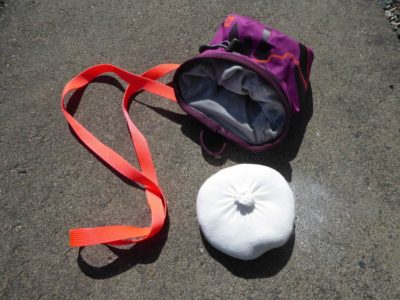Bouldering is catching on as a great way to exercise in a fun and social environment. If you are a heavy person, you may have been wanting to try the sport, but did not know if it is possible at your current weight.
Can an overweight person do bouldering? Many heavy people have successfully taken up the sport and find themselves enjoying it enormously. As a result of coping with extra weight during climbs, overweight people who lose pounds with regular bouldering find themselves with a strength and technique advantage. Obesity, however, can be an issue for technical reasons like body mass blocking view of footholds and interfering with moving along against the wall.
Whether you are fine with your size and just want a fun way to build strength and flexibility, or you are looking for a fun and social activity that might help with your weight loss journey, read on to see if bouldering sounds like a good fit for you.
Can I Try Bouldering Even If I Am Overweight?
There are three basic issues when heavy people try bouldering. First is the social issue of self-consciousness, of feeling conspicuous, of worrying that others will think that you do not belong in a bouldering environment. The second issue is one of performance: will I be able to do this, how will my weight affect how I can climb? The third is about safety considerations when bouldering with excess weight.
In Regards to Feeling Self-Conscious
Although it may be more acute for those who are very conscious of their weight, self-consciousness applies to every single person new to the sport. Absolutely everyone feels that the entire gym is focused on them when they start out. But bouldering is a very accommodating sport, and you will see many people who do not fit the image of the stereotypical bouldering body or even the stereotypical bouldering age. There will be other overweight people at the bouldering gym, and many of them will be climbing impressively well.
Everyone starts at a different level of ability, as is expected in a demanding sport like bouldering. A 300 lb (136 kg) person who is out of condition may spend the first month or two just hanging from the wall for several moments at a time, but by persisting, eventually will able to send a V0 problem. The exhilaration from this type of accomplishment is priceless. In bouldering as in many challenging sports, persistence earns as much respect as skill.
How Will Your Weight Affect Your Bouldering?
It’s not a surprise: as weight comes off, climbing improves. One climber observed that losing 30 pounds (13.6 kg) allowed his climbing to improve by two grades. But even without weight loss, performance improves with practice. Heavyweight boulderers often develop better than average technique, since the extra weight prevents an over-reliance on muscle power to get through moves.
There are drawbacks, of course. Someone who is carrying extra weight in front will be further away from the wall than the norm, which may cause the arms to fatigue faster. Overhangs and roofs will be especially challenging, and you may find that your feet have more of a tendency to slip off the holds on these types of problems. Fingers and tendons will be more stressed than in someone of average weight.
Again, if you are carrying most of the weight in front, vertical walls will be more challenging than starting off with problems that have an incline. An example of a vertical wall is one that goes straight up, or almost straight up, like climbing a ladder. An angled wall will be more like making one’s way up a rather steep slope, where you are leaning forwards instead of standing.
Inclined walls will help you develop good solid footwork while you figure out how vertical you can go before stomach-against-wall becomes a performance issue.
Breathing deep and even while on the wall will help with muscle fatigue.
Are There Weight Limits to Bouldering?
Being overweight should not be so problematic as to rule out bouldering, but obesity could be, mainly because of technical issues.
Being obese, in other words having a body mass index over 30, could interfere with being able to reach for distant holds, and being able to shift positions easily due to body mass pushing against the wall. See the extra questions below for how to calculate your body mass index.
Good footwork is very important for heavier climbers, but an obese person will find it much more difficult to see their feet and footholds.
Unlike with traditional climbing, with its harnesses, belay ropes and rest stops, in bouldering we must be able to support our own weight the entire time we are on the wall. With obesity, the strength to weight ratio may be exceeded to the point where bouldering is not possible without first building up some body strength.
If in doubt, it’s always a good idea to start out by having a conversation with your doctor. If the spirit of adventure still leads you to the bouldering wall, do check out the safety suggestions below.
Bouldering is about testing one’s own boundaries, so enjoy, take your time, and don’t rush advancing through the V grades.
Safety Considerations
All new climbers must be made aware that muscles will react to exercise faster than tendons and ligaments. Tendons can take over a year to adapt to a new stress, and the additional load for heavy boulderers means taking extra care. Ease off at the first twinges, and take a break from bouldering until the tendon pain is gone.
Falls can be more risky for a heavier person. We can blame Newton’s Second Law of Motion for this, which tells us that the net force on an object is equal to the object’s mass multiplied by the object’s acceleration.
Since the acceleration of gravity is the same for everyone, a heavier person will land with more force due to the extra mass. Landing with more force will increase the risk of injury. It is therefore very important to have mastered good landing techniques. The best way to learn how to land safely is to take a course at your bouldering gym.
If you are worried about falls, a good place to start is on a traverse route. Unlike regular problems, a traverse is where distance is covered horizontally along the wall, without gaining height. Traversing allows you to see where you are at in terms of ability and confidence before committing to vertical challenges. Have a spotter for extra assurance.
It is very important to avoid jumping down from the wall as much as humanly possible. To find out why everyone – and not just heavy climbers – should avoid jumping down, and to learn a few basics on proper landings, click here for an article on this topic.
What to Focus on When Bouldering as Plus Size
Like any new person to the sport, starting out with the lowest, easiest V grade available is the smart thing to do. If you have any doubts at all about being able to hang on to the wall, start your first session with a traverse problem that keeps you close to the ground.
You may be surprised by the friendly helpfulness of people in the bouldering gym. Bouldering is a very welcoming sport. Accept any offers of help or advice with a smile and make no excuses for your performance. Many, many people have issues that they perceive as making them less than perfect for bouldering, such as being shorter, weaker, or older than the average person who goes to a bouldering gym. None of it is reason to feel apologetic.
Focus instead on learning good technique, improving flexibility and footwork, and working on core strength. Good technique will help offset the challenge of climbing with extra weight. Flexibility and footwork will help with reaching holds in distant or awkward locations. A strong core will help with keeping the hips closer to the wall, which helps to ease stress off the arms.
Use your legs more than your arms. Climb and you will get stronger.
Related Questions
What is the definition of obesity? The World Health Organization defines obesity as having a Body Mass Index (BMI) of 30 or more. Overweight is a BMI of 25 to just below 30. The calculation for BMI is weight in kilograms divided by height in meters squared (Google is great for conversions to metric): BMI = Kg/(m^2). For example, if your weight is 300 pounds and your height is 6 feet, your BMI is 136 kg/(1.83^2) = 136/3.35 = 40.5
Will my weight have an impact on how high a grade I can send? Weight in itself is not as significant as excess fat and a low level of fitness. In other words, strength to weight ratio plays a major role. Less weight, for the same amount of strength, yields higher V grades. Unless one is unfit and seriously overweight, V5 to V8 seems to be where excess weight really starts to impact performance. Keep in mind that with regular bouldering, you will be replacing fat with muscle, so your weight may not change much initially. Here are some specific examples on the effect that weight gain and weight loss can have on V grades:
- One climber maintains that at 160 lbs (73 kg), he can do V6 and V7 problems, but gaining an extra 10 lbs (4.5 kg) drops this to V5 and V6.
- Another started bouldering at 218 lbs (99 kg) doing V1, and could only move up to V2 and V3 after losing about 6 lbs (3 kg).
- Someone else was stuck on V2 and V3 for a year, but could quite easily do V4 as soon as weight dropped from 170 to 155 lbs (77 to 70 kg).

